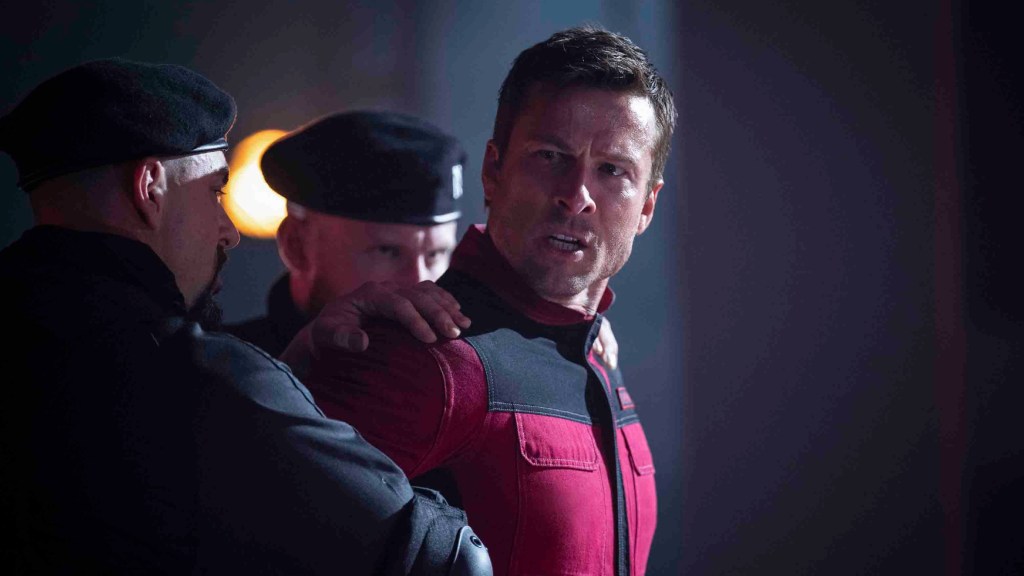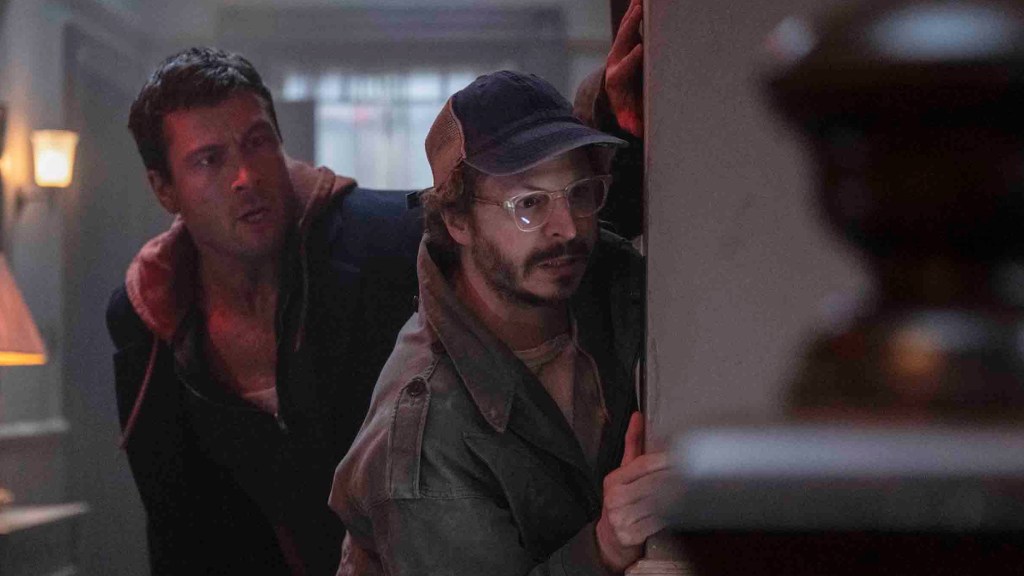In an alternate future, The Running Man follows Ben Richards (Glen Powell), a desperate man who just wants to provide for his family. After being blacklisted by vengeful bosses and unable to recoup the measly salary he was earning, he turns his mind toward putting his pride aside and earning money on one of the many exploitative game shows run on television. Though he intends to audition for any other show but “The Running Man,” his anger makes him the prime candidate to be hunted for sport in front of an audience of mouth-foaming, eager beavers. As he roams across America fighting for his life, he comes to realize how rigged the system really is.
Videos by ComicBook.com
Director Edgar Wright’s movies have long been defined by his frenetic camera work and an energy that has long felt impossible to replicate by imitators. It’s present from his first film, Shaun of the Dead, through the likes of Hot Fuzz and Scott Pilgrim vs. The World, and appears to have reached its peak with Baby Driver. Even Last Night in Soho is a movie that blends his frenzied visual motifs, but troublingly paired it with an incomprehensible narrative. To that end, we arrive at The Running Man, which only shows off Wright’s signature pizazz in fits and spurts, though its leading man, Powell, does manage to keep you engaged.
Some action sequences, like a car chase shot from Richards’ perspective in the trunk, capture that manic spirit and give the movie a boost. Another, captured from the perspective of the floating cameras that broadcast the series, follows Richards as he runs through an old hotel to elude his killers. These moments feel quintessentially within Wright’s canon, which makes some of the movie’s less compelling action sequences stick out like sore thumbs. These action scenes, which are thankfully in the minority, appear shot and chopped by multiple units, eliminating any sense of blocking from the sequence and excising Wright’s trademark spirit.
Rating: 3 out of 5
| PROS | CONS |
| Good performances (especially by supporting actors) | Inconsistent tone |
| Succinct worldbuilding | Satire largely fails |
| Unique action scenes | Ending feels disconnected |
Glen Powell Carries The Running Man, Even if It Stumbles Frequently

Powell’s take on Ben Richards is a man defined by rage, who begins the movie at a 10 with no other level to push his anger but to the upper echelons of fury that border on parody. It’s a piece of the larger structure of The Running Man that can be summarized by an unfortunate word: inconsistency. As the film carries on, Powell must search for new levels of bitterness, often matching the same energy he’s been displaying since the beginning. Luckily for him, Powell is flanked by a slew of actors who make brief appearances either helping him on his journey or trying to complete the kill, and they all make the most of the real estate they’re afforded.
Josh Brolin as Dan Killian, the interminable creator and producer of “The Running Man,” spends most of his scenes in the film talking to Powell on a screen. It would be easy for a performance like this to feel stiff and lifeless, but Brolin sells the slime of Killian with a pearly white smile, clearly channeling something from his years in Hollywood. On the flipside is Colman Domingo as Bobby T, the host of “The Running Man,” who has the best batting average when it comes to jokes in the film. Though both actors give their all in these roles, there’s still something missing. Each appears to have just one “mode,” and though they are entertaining to watch, it makes them one-dimensional. About the only positive thing one can give the 1987 The Running Man in favor of this one is that it merged these two characters into one, with Richard Dawson fully hamming it up like a deli at lunch rush.
On the other side of Powell’s journey is Jayme Lawson (The Batman) as Sheila Richards, Ben’s wife, who largely has a thankless role as the focus shifts from her very quickly. That said, Lawson makes her time on screen work, rising to the occasion of the desperation that their situation calls for. There’s also Daniel Ezra (All American) as Bradley Throckmorton, a man who helps Richards in Boston get out of the city after he managed to level a city block. Ezra is a surprise weapon for The Running Man, revealing himself to be a masked antagonist known as The Apostle who exposes The Network’s editing tricks and deceptions, a sequence that once again offers Wright the chance to show off his personality within the dour confines of the world itself.
The Running Man’s Satire Falls Face First

Based on the novel by Stephen King, The Running Man‘s script is written by Michael Bacall and Wright, who previously worked together on Scott Pilgrim vs. The World, and as expected, the film is dripping with satire about every conceivable topic. The trouble with most of The Running Man‘s satire, however, is that most of it fails to bring anything of note to the table that hasn’t been done before, or even really makes a point. This is largely in part because it’s only so many degrees removed from our reality that the joke has been constructed. One recurring motif, The Americanos, which is a parody of The Kardashians, is indistinguishable from that series in its sincere form. Much of The Running Man’s satirical moments are unable to offer even a hint of commentary, failing to have a punchline beyond “Wow, isn’t this thing annoying and awful?”
To that end, most of The Running Man‘s larger swings at mockery feel run into the ground, the kind of stale observations about commercialization and manipulation by the media that are as deep as a puddle. Not only did 1987’s RoboCop manage to skewer even more topics with a more succinct punch, it did it about four months before the Schwarzenegger version of The Running Man premiered (the new film is simply another adaptation of King’s work, not a remake of that movie).
There’s also the problem of The Running Man trying to skewer some of the topics that it has chosen, only to turn around and subject itself to the very same thing. It can’t be lost on the audience that the movie mostly uses fake brands in its ads, only to have Michael Cera offer Richards a Monster Energy drink after delivering an eloquent explanation about the powers of the police state. Even as a joke, it lacks any tangible remarks and contributes to a clear misunderstanding of its own satire.
The Running Man’s Finale Fails to Connect

Perhaps one of the most troubling aspects of The Running Man’s big picture view of the world it presents is how unserious it treats the few characters it allows to have conviction beyond Richards himself. The script has an incredibly pessimistic view of anyone with a semblance of a spine, often damning them for daring to dream and utilizing their viewpoint as a punchline. Only a few characters are even given the distinction of having the gumption to stand up to authority, with Michael Cera’s Elton making the biggest impact on the story. Cera does great with the screen time he has, becoming one of the most memorable characters in The Running Man, which is saying something, given the bombastic personas that occupy the rest of the film. The Running Man naturally has to build toward its fiery finale, but it doesn’t have to maintain such a fatalistic view of people with a conscience along the way.
That said, the finale of The Running Man is the clearest piece of evidence yet that it has connectivity issues. Though its final action scene manages to harness Wright’s creativity in ways that have been squandered before it, the setup for the actual conclusion is clunky and hamfisted. Not only does the movie quite literally stop so that The Apostle can appear on screen to explain to the audience what happened in the aftermath of the final action scene, but it also dumps exposition on the audience in a tactless way. It may be in keeping with the spirit of how The Running Man has framed its opposition, but in practice, it comes across like a YouTuber stopping the film ahead of its conclusion to just explain everything to you in an irritating fashion.
The Running Man is good, not great, a movie that is usually entertaining but one that starts to fall apart as the details are considered inside of it. As a result, the film is one of the weakest movies in Wright’s larger oeuvre, which, to his credit, was defined by banger after banger for many years. As a result, even a movie that’s just “okay” from this director largely makes it better than most of the mainstream studio movies you’ll find playing in the theater, but it can’t help but be a little disappointing given his larger history as a filmmaker.
The Running Man opens in theaters on Friday, November 14th.








